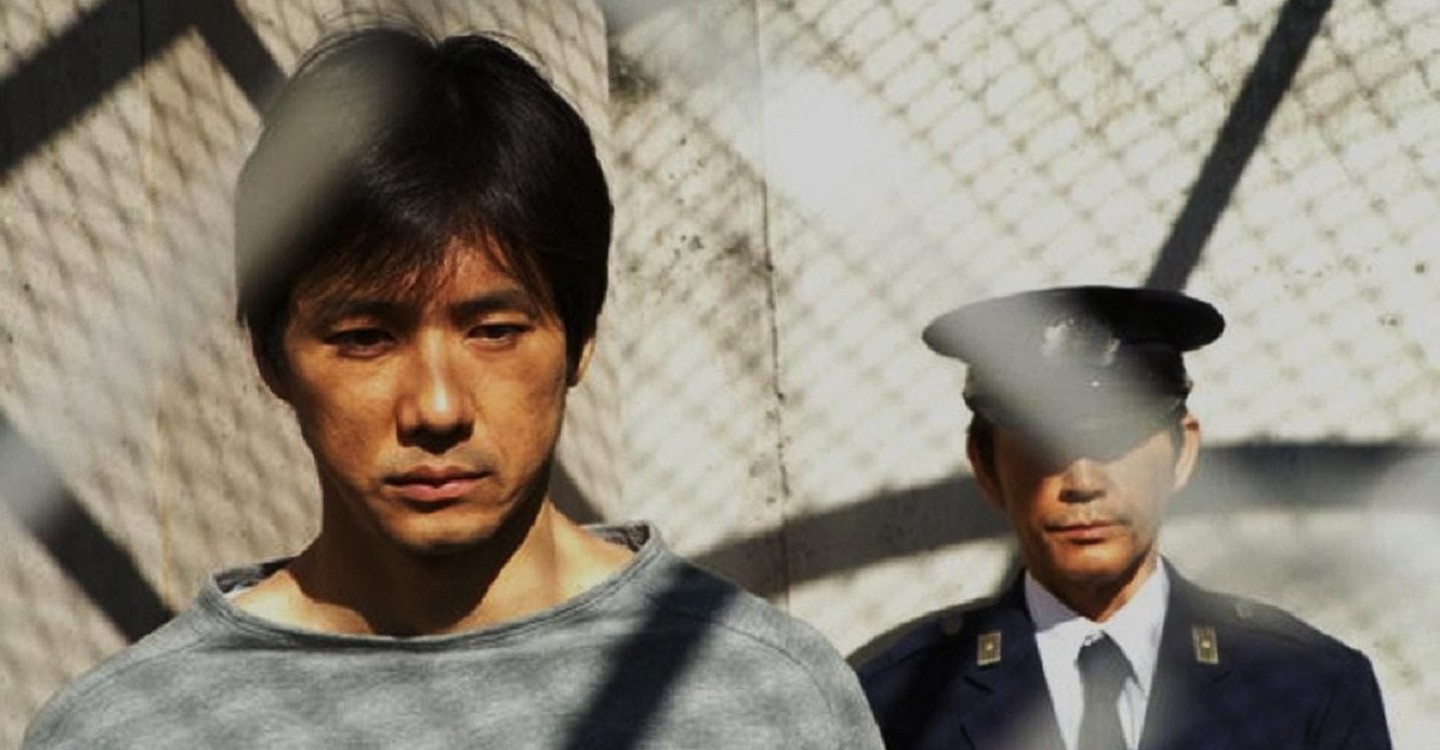By Chlotrudis Independent Film Society
Rating: 5 cats
Director: Hajime Kadoi
Starring: Hidetoshi Nishijima | Kaoru Kobayashi | Nene Otsuka | Ren Ôsugi

Original language title: Kyûka
Country: japan
Year: 2009
Running time: 112
IMDB: http://www.imdb.com/title/tt1244858/
Jason says: “Toru Hirai (Kaoru Kobayashi) is dragging. He falls asleep while riding the train with his fiancée Mika (Nene Otsuka) and her son Tatsuya (Shusei Uto), but you don’t need that to see it. He’s middle aged, but it’s tough to tell whether he’s deep into it or just looking old before his time. The days are just grinding by.
“If that’s true for Toru, though, it’s a hundred times more the case for Shinichi Kaneda (Hidetoshi Nishijima). Kaneda is locked away in the prison where Toru works as a guard, on death row in fact. He does not cause any trouble, and there are signs he feels remorse. It doesn’t register with him when his lawyer says he may have grounds for an appeal; it’s just a bit of noise to the background of his days of solitude and carefully supervised exercise. He doesn’t know, but his execution has been authorized for a Friday in November – the day before Toru’s and Mika’s wedding. A guard who takes the most disturbing job in the execution – ‘supporting’ the hanged prisoner after he drops through the floor – will get the next week off, but it’s not really the sort of experience one would like casting a shadow on one’s honeymoon.
“The parallels between the two characters are obvious; VACATION is a film about people just marking time as they live their lives. For some, like Kaneda, it’s involuntary. Toru, on the other hand, is like too many of us, repeating days without getting joy out of them. It’s mentioned that his last vacation was spent on his mother’s funeral, and at times his engagement to Mika seems perfunctory at best. They often seem to barely know each other; foreigners like myself may watch their interactions and wonder whether arranged marriages are still common in Japan or whether there is simply enough social pressure brought to bear on widows and other singletons over a certain age that marriages might as well be arranged.
“That sort of dispassionate look at Toru’s circumstances might indicate him as a man to be shown pity or contempt, but Karou Kobayashi makes him more interesting than that. The script doesn’t reveal hidden depths to Toru, but Kobayashi does not have him walk around as bored or hollow. He’s reserved but engaged, perhaps too patient for his own good. Our feelings toward him are generally positive, and although he may not be the ideal prison guard, we measure all the others we see against him . His scenes with young Shusei Uto are great; the kid is not ready to accept a new father, and the few words that pass between Toru and Tatsuya show a boy not looking to accept a new father figure and a man who has mastered the art of being present but not forcing himself into another’s life. That’s maybe not the best basis for a relationship, and we seldom see exactly how things between Toru and Mika work. Nene Otsuka makes Mika appealing, and the decision to have her not outwardly desperate or appearing pressured is refreshing.
“As good as the other performers are, though, and as much as this story is at its heart about Toru, it would be hard for Hidetoshi Nishijima’s Kaneda not to steal a large portion of the show. Part of is that we learn just enough about him to temper any instinctive hatred we might have for a murderer on death row (assumed to be the worst of the worst); but the trick is that even once we’ve learned that, Nishijima does not give many hints that Kaneda is either angry at his fate or feels that it is right. We see a man where the combination of guilt and crushing routine have drained most reservoirs of personality or self away. And then, as he realizes that the end is coming, we see a truly spectacular blind panic as he realizes that he is not all gone, but that the rest will be taken away soon. It’s as convincing a display of raw terror as you’ll see on screen.
“He gets a little help there from director Haime Kadoi. Kadoi does a great job throughout (from a script by Dai Sako and a novel by Akira Yoshimura), but the way he and cinematographer Yukihiro Okimura shoot Kaneda is particularly fascinating. From many angles, Kaneda’s cell looks like a more cramped than average Tokyo studio apartment. It looks normal until we see how restrictive it is, when the doors open up and the guards stand just outside. That scenario is repeated just enough that we see just how repetitive his life must be, although not in such a way that it’s obvious that Kadoi is trying to make that point. The spaces Toru inhabits are also often strangely spartan – there’s something a little cold about the places where Toru and Mika plan and hold their wedding reception, especially. It’s all the more remarkable that some spaces seem to turn much more friendly as Toru and Mika draw closer.
“There’s something a little bit inspiring about that. As much as opening up is shown as dangerous at several points during Vacation, it’s also the thing that can give Toru’s life something beyond honor and usefulness. 5 cats
“Seen 28 November 2009 at the Museum of Fine Arts Remis Auditorium (New Japanese Cinema)”
